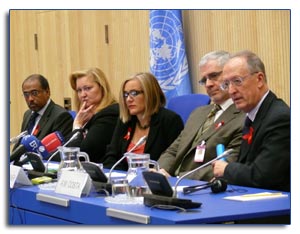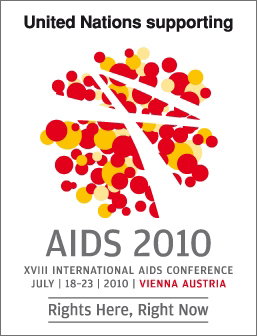
|
|
The speakers were (from left to right in the photo) Michel Sidibé, Executive Director, Joint United Nations Programme on HIV/AIDS, Dr. Brigitte Schmied, AIDS 2010 Local Co-Chair and President, Austrian AIDS Society, Robin Gorna, Executive Director, International AIDS Society, Dr. Julio Montaner, AIDS 2010 Conference Chair, IAS President and Director, BC Centre for Excellence in HIV/AIDS in Vancouver, Canada and Antonio Maria Costa, Executive Director, United Nations Office on Drugs and Crime. |
The Executive Directors of the Joint United Nations Programme on HIV/AIDS (UNAIDS) and of the United Nations Office on Drugs and Crime were two of the speakers at the press briefing on Wednesday 10 March organized by UNIS Vienna and the XVIII International AIDS Conference (AIDS 2010) held to give an overview of the AIDS 2010 conference which is being held in Vienna from 18-23 July 2010. The United Nations, through UNAIDS and UNODC is supporting the conference which is organized by the non-governmental organization the International AIDS Society.
The press briefing coincided with the 53rd session of the Commission on Narcotic Drugs and also highlighted the important role the conference will play in advancing efforts to increase global access to programmes proven to lower HIV infection rates and improve access to HIV treatment among people who use drugs.
AIDS 2010 Local Co-Chair and President, Austrian AIDS Society, Dr. Brigitte Schmied told journalists that the conference was the premier gathering for those working in HIV/AIDS and 25,000 participants including 2,000 journalists were expected to come. Vienna was chosen for several reasons, she explained, one being that it had served as a bridge between East and West in the past and would again -the rapidly growing HIV/AIDS epidemics in Eastern Europe fuelled primarily by unsafe injecting drug use would be one of the issues under the spotlight at the conference.
An estimated 1.5 million people are living with HIV in Eastern Europe and Central Asia. Sharing needles and injection equipment is thought to be three times more likely to transmit HIV than sexual intercourse.
Yet, as the results published in The Lancet last week show, injecting drug users often have little or no access to evidence-informed comprehensive HIV services. Globally, only 2 needles and syringes per injecting drug user are distributed per month, only 8 per cent of injecting drug users receive opioid substitution therapy, and only 4 per cent of HIV positive injecting drug users receive antiretroviral therapy (Mathers et al, 2010).
 AIDS 2010 Conference Chair, IAS President and Director, BC Centre for Excellence in HIV/AIDS in Vancouver, Canada, Dr. Julio Montaner told the briefing that we now had the tools to stop HIV/AIDS and if we had not done so it was because of a lack of political will. Antiretroviral therapy was able to put HIV into full remission he said and we were able to virtually eliminate HIV transmission. So mothers with HIV can, with therapy, give birth to babies who do not have HIV and the mothers will be able to survive and care for the child for many years.
AIDS 2010 Conference Chair, IAS President and Director, BC Centre for Excellence in HIV/AIDS in Vancouver, Canada, Dr. Julio Montaner told the briefing that we now had the tools to stop HIV/AIDS and if we had not done so it was because of a lack of political will. Antiretroviral therapy was able to put HIV into full remission he said and we were able to virtually eliminate HIV transmission. So mothers with HIV can, with therapy, give birth to babies who do not have HIV and the mothers will be able to survive and care for the child for many years.
The Executive Directors of UNAIDS, Michel Sidibé, warned that AIDS was not over with 5,000 people still dying every day.
UNODC Executive Director Antonio Maria Costa told the briefing that UNODC was the lead agency within UNAIDS for HIV prevention, treatment, care and support for injecting drug users, in prison settings and for victims of trafficking. It works in 55 priority countries in Africa, Eastern Europe and Central Asia, South and South East Asia, Latin America and the Caribbean, helping countries to provide drug users, prisoners and people vulnerable to human trafficking with comprehensive evidence-informed HIV services.
"We can and must reverse the HIV epidemic, first of all by preventing the spread of drug use, and then by providing treatment to addicts. In this comprehensive programme, HIV-targeted measures include providing clean injecting equipment, opioid substitution, and antiretroviral therapy," said Mr. Costa.
The conference will also examine worldwide progress towards the 2010 deadline set by world leaders in the Millennium Development Goals for universal access to treatment for HIV/AIDS and HIV prevention.
In response to a question Mr. Sidibé said that 4.7 million people now have access to antiretroviral treatment but 11 million people with HIV are still waiting for the same life-saving drugs. It had increased tenfold in the last four years but it was still not enough, he said. The Executive Director, International AIDS Society (IAS), Robin Gorna, added that only four per cent of drug users have access to treatment compared to 30 per cent of all those with HIV.
The conference has the theme Rights Here, Right Now, emphasizing the central importance of human rights in responding to HIV. For more information on AIDS 2010 go to www.aids2010.org